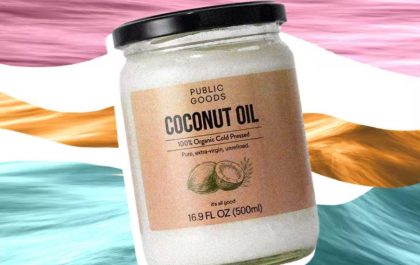Table of Contents
Coconut Oil for Hair – Need to Know About Using Coconut Oil for Your Hair
coconut oil for hair may help repair everyday damage, improve texture, and restore health and shine to your hair. It also pronounces how to use it and choose a good oil.
Coconut oil is a fatty oil complete from raw or dried coconuts. It looks solid, white butter at room temperature and melts when heated.
This natural oil for traditionally used for food, cooking, and hair and beauty treatment.
There’s plenty of medical exploration on the fitness benefits of coconut oil for your body, skin, and hair. About people use coconut oil on their hair and scalp since it helps hair grow faster. We’ll explore if this is effective.
If you’re looking for soft and lustrous hair, you might try reaching for a jar of coconut oil. This natural oil is suitable for nearly all hair types and is packed with fatty acids good for your skin and hair.
Benefits of coconut oil for Hairs
Healthy hair depends on protein.1 However, dyes, bleach, shampoos, and styling products can damage that protein and leave hair dull and fragile.
Up to 30 out of a hundred of your daily calories should come from healthy fats. So you add coconut oil to your diet and use it in your cooking.
Eating coconut oil strengthens stretch your improved, faster-growing hair. You power notice a difference, especially if you aren’t getting plenty natural fats and extra nutrients in your diet.
Using coconut oil as a hair then scalp cover may also help kill hair lice and lice eggs.
Risks of coconut oil for Hairs
Fights fungal infections
Healthy hair begins at the root. So possession of your scalp healthy may help your hair grow better.
One recent lab education found that coconut oil helped eliminate some fungal infections.
Coconut oil may help heal or avoid dandruff and other fungi on the scalp. However, more research is needed to distinguish if coconut oil has the same health benefits on the skin and scalp.
Coconut oil is a natural saturated fat. However, the fat in coconut oil can help seal hair moisture. In addition, the high-fat content might relieve calm scalp irritation, flaking, then itching.
Treats Split Ends
A review in 2015Trusted Source noted that coconut oil engages hair strands better than mineral oil and other kinds of fats. This strength helps prevent hair breaking and split ends.
For this reason, you may need fewer decorations when you use coconut oil on your hair regularly. This might make it appear like your hair is mounting longer, faster.
Extra evaluation on the uses of coconut oil in India creates that the oil may help reduce protein loss in hair. This avoids dry, breakable, or breaking hair. In addition, the researchers note that coconut oil is used in India as a hair mask and leave-in conditioner after showering.
Protects from Heat and Damage with Coconut Oil for Hairs
Using a minor amount of coconut oil on wet hair before ventilation or heat styling may protect hair from water and heat damage. Hygric fatigue happens when the hair swells up from too much water. This can type hair drier and feebler over time. However, too considerable swelling can damage the hair or make it break.
In a 2015 report, researchers reviewed numerous studies testing the effects of plant-based oils on human hair. The authors noted that coconut oil is comparable to natural hair proteins and can penetrate the hair shaft uniquely. Coconut oil can condense water absorbed into your hair by penetrating the hair. This helps limit everyday hair damage.
In addition, one reviewed study resolute that coconut oil was the only oil capable of plummeting protein loss. This was correct for undamaged and damaged hair when participants used the oil as a pre-wash and post-wash preparing creation.
This study also sized up the belongings of mineral oil and sunflower oil on hair. Neither facilitated reduced protein loss.
Dry Scalp, Dandruff in coconut oil for Hairs

There is an indication that you can use coconut oil to luxury a dry, itchy scalp and supplementary dandruff.
A 2021 study of 140 individuals in India—70 with dandruff and 70 without—found that topical claims of coconut oil to the scalp had antiseptic and antifungal benefits. It also fought scalp flaking.
Other explore displays that coconut oil may help repair the skin barrier, the top layer of your skin. This would make it a good action for both dandruff and dry skin.
Ways to Use
One of the most excellent versatile haircare oils, coconut oil can work wonders as a pre-shampoo action, conditioner, designing aid, or mask.
Here’s a look at four humble ways to refresh your haircare routine with coconut oil
Pre-wash protector: Once applied before shampooing, oil can stop your hair from soaking up too considerable water and, in turn, stave off harm and dryness.8 Try using coconut oil about 15 to 30 minutes before you wash, directing on the midsection and ends of your hair.
Conditioner: Like any good conditioner, coconut oil might strengthen the hair shaft and prevent breaking. You can use coconut oil as another too typical conditioner. Or add a few oil droplets to your regular conditioner to improve its soft influence.
Styling aid: Just a bit of coconut oil container goes stretched once it comes to taming frizz. For easier absorption and styling, type sure to apply the oil to damp hair.
Wash it out after short hours, or leave it on overnight if you have extra dry or damaged hair.
Some hair care experts suggest using oil about two to three times weekly for best results.
Using Coconut Oil in Hair Care
Coconut oil may benefit all hair types. It is perfect for dry, damaged, or color-treated hair.
However, there’s some apprehension that frequent oil may lead to stiffness for those with coarse hair textures.
To brand the greatest out of using coconut oil in your hair care regimen:
Coconut oil may be informal if you are heartfelt before applying it to your hair. Warm the oil first. Place a teaspoon of the oil into a bowl and residence it into a bottle partially filled with hot tap water. The coconut oil resolve to develop liquid in a few minutes. You can also set the solidified oil in your palm and rub your hands together to melt it. Evade microwaving the oil to prevent it from becoming perilously burning.
Make a combination. Complement a short drop of essential oils like purple or peppermint into your coconut oil for additional aromatherapy benefits. You can also mix coconut oil with hair-nourishing natural ingredients like yogurt, honey, or avocado.
Use it at night. It takes a period for hair to absorb oil, so if you use it in the morning, your hair can breeze up observing and sensitivity oily. In its place, apply it at night, then shampoo in the morning.
Even though it’s comparatively light, coconut oil can weigh your hair down if you use it too much. To avoid build-up, start with a small amount—no more than a teaspoon—and gently massage the oil done your hair, starting at the midsection and current to the ends. Apply lightly. If you have impenetrable hair, you may be able to use it a bit more without issue.
Don’t clog your scalp. Some people find that smearing coconut oil directly to the scalp can alleviate dryness. On the other hand, others struggle with impatience and blocked pores. If you’ve never used coconut oil on your scalp, start with a slight quantity until you know how your skin reacts.
Shampoo twice. When removing oil from your hair, consider that a second shampoo application may be necessary to eliminate sickness.
Conclusion
Coconut oil may help cream and repair injured. It has also remained exposed to prevent dandruff. You can use it as a pre-wash action, conditioner, or hair mask. Use a small amount at first to see how your skin reacts. Then, if there are no issues, apply the oil about two to three periods weekly.
Remember, a little goes a long way, so use just a teaspoon, focusing on your hair’s midsection to the ends. Select unrefined coconut oil for the best results.
How to Make Coconut Oil for Hair? – Knows, Benefits, Risks, And More
Related posts
Featured Posts
How to Make Coconut Oil for Hair? – Knows, Benefits, Risks, And More
Coconut Oil for Hair – Need to Know About Using Coconut Oil for Your Hair coconut oil for hair may…
These are the Top Vitamins for Hair Loss
These are the Top Vitamins for Hair Loss – Vitamins play a vital role in the functioning of the body….


